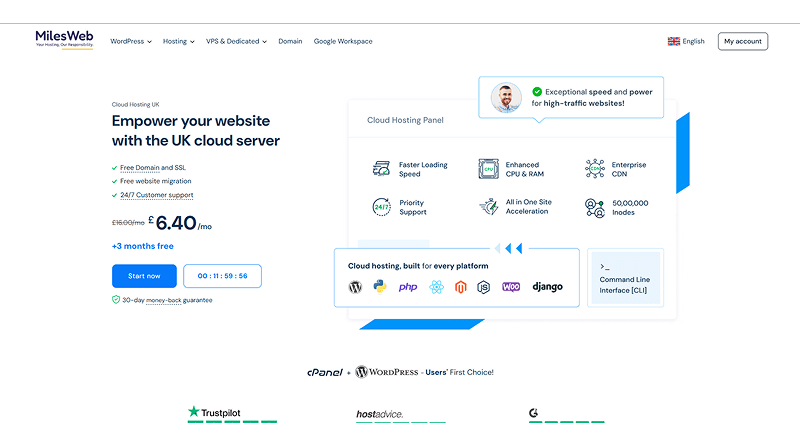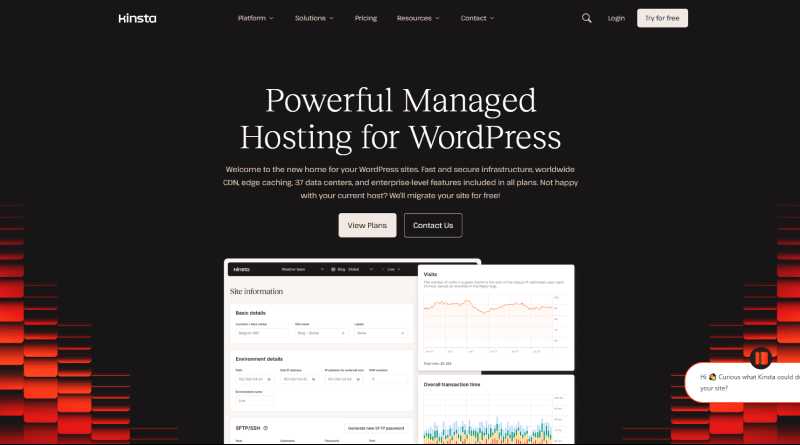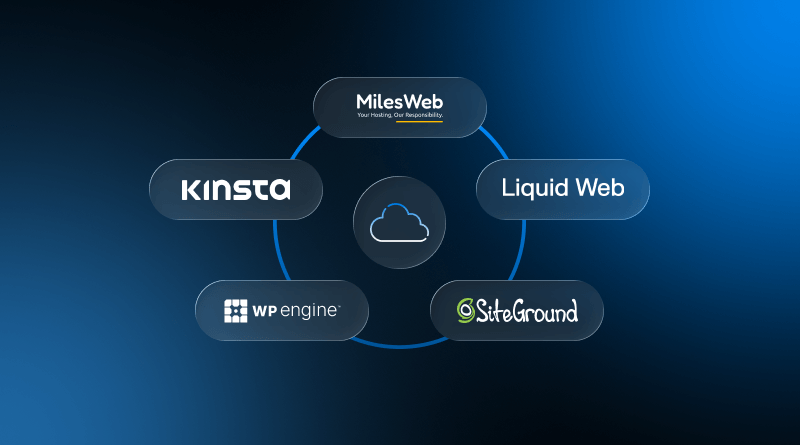Envision your website or application thriving online, gradually capturing increasing attention. Your traffic is increasing, expectation levels are rising, and all of a sudden, you start to think about whether your current hosting solution is optimal for your long-term goals. It could be that you desire greater customization over certain configurations, you want stronger customer support, or you desire an elastic pricing model. These are all common pain points that website owners, devs, and businesses encounter when going online.
Cloudways is a common solution that a number of people opt for when it comes to managed cloud hosting. It serves as a layer of communication between customers and AWS, Google Cloud, DigitalOcean, and Vultr. It alleviates all server management and security updates, as well as performance tuning. Cloudways finds a sweet spot between control and convenience. Yet, no one solution is optimal for everyone.
The ease of access and managed web hosting that Cloudways offers is unrivaled, but it can be a deal breaker for certain companies. Direct raw cloud access is a requirement for some companies. Others are simply looking for more affordable cloud hosting with different tools, as well as specialized solutions for WordPress, eCommerce, and scaled enterprise projects.
This is exactly where the alternatives to Cloudways come in. This guide reviews the best managed hosting, like Cloudways, analyzes Cloudways vs. self-managed hosting, and presents the best Cloudways competitors. By the end, you will possess an undeniable insight into the hosting market and will be in a stronger position to select a provider that fulfills your unique requirements and objectives.
Related Read: Best Cloud Hosting Providers in India 2025
Table Of Content
Why Look For a Cloudways Alternative?
Although Cloudways is a nice choice for many, it doesn’t always mean that it would be the best for your website or business model. A primary reason users seek out Cloudways competitors is due to a lack of sufficient specialized hosting. E-commerce platforms like Magento or WooCommerce, for example, often need more specialized performance and support than a specialized provider can offer.
Server control is another consideration. Cloudways takes care of a good portion of the infrastructure, which is nice, but it is also a drawback. For developers who want root access or want to be able to build out their technical stack, it is better to choose providers that offer complete server control.
Access to these features is subject to the pricing tiers set forth, which, while understandable, is also a recurring concern. The pay-as-you-go pricing model adopted by Cloudways may be beneficial for flexibility, though it is entirely unhelpful for people looking for set pricing. Finally, the advanced support tiers, additional features, enterprise integrations, and other business requirements that some companies have may exceed Cloudways’ current offerings.
Top 5 Cloudways Alternatives For Managed Hosting
Here are the top five Cloudways competitor options for you.
1. MilesWeb: Managed Hosting with Local Focus and Flexibility

MilesWeb is an Indian hosting company offering a wide range of managed hosting options (shared, VPS, Cloud, and dedicated servers) and focusing on ease of use, local assistance, affordable pricing, and complete server management.
Key Features & Strengths
Performance
- MilesWeb employs container-driven resource isolation (via CloudLinux/LVE) to optimize resource use on its managed-cloud platform.
- For dedicated servers, the company provides a network bandwidth of up to 25 Gbps and root/admin access.
- They additionally offer a CDN and other caching tools to assist with global delivery.
Support
- 24/7 customer service via live chat, email, and ticketing is included.
- They also offer complimentary assistance to clients relocating their websites to MilesWeb.
Pricing Model
- MilesWeb’s managed shared, VPS, and cloud hosting plans are tiered.
- They frequently have promotional pricing (starting from £1.20/month) on entry plans, such as shared hosting.
Key Features
- Certain dedicated server plans offer Remote/Administrative Access.
- They also handle other servers like the database, monitoring server performance, reporting security, and managing services on AWS.
- They guarantee 99.9% uptime and provide a 30-day money-back window.
Best For
- Bloggers, mid-market businesses, and agencies within India or South Asia that need managed hosting, decent local support, and reasonable pricing.
2. Kinsta: The Premium WordPress Container Host

Kinsta is a premium managed WordPress host, built on top of Google Cloud infrastructure, and aims for rapid growth. It focuses on ease of use, high performance, and WordPress-specific optimizations.
Key Features & Strengths
Performance
- Runs on Google Cloud’s C2/C3 machines with auto-scaling, container-based architecture, and edge caching.
- Built-in CDN (via Kinsta CDN) and HTTP/3 support.
- Time-dependent caching of server resources and selective Redis integration.
Support
- Technical support is available every day and all day through live chat systems. Many support agents specialize in WordPress.
- Many support agents specialize in WordPress.
Pricing Model
- Charged in tiers according to the total number of websites, the total number of visits, and the total number of resources used.
- The payment is not pay-as-you-go: choosing a plan determines the total capacity that can be used.
Key Features
- Full-feature plans offer active systems that support staging environments, site cloning, and selective backup retention windows.
- Automated systems that provide resource scaling and elasticity within plan limits.
- Unlimited migrations are available under select plans.
Best For
- Agencies, high-traffic WordPress sites, and businesses wanting ultra-performance will find the best use for this.
3. WP Engine: The WordPress Powerhouse

Founded in 2013, Texas-based WP Engine was one of the first companies in the world to provide managed WordPress hosting, and it continues to specialize in performance, developer functionality, and enterprise polish.
Key Features & Strengths
Performance
- Custom EverCache caching technology, global CDN, and premium network infrastructure (Google Cloud).
- Automated performance optimization, scaling PHP workers, and multiple caching layers.
Support
- 24/7 support; higher-tier plans include dedicated account managers.
- Extensive documentation and developer tools.
Pricing Model
- By the number of sites and monthly visits.
- Costs can escalate if you exceed allocated visits or resources.
Key Features
- Staging environments, incremental backups, security scans, and plugin restrictions (for stability).
- Developer tools: Git, SSH, WP-CLI.
- Improved e-commerce functionality, integration tools, and headless WordPress.
Best For
- Businesses that need high-quality WordPress performance and tooling support and that accept tighter controls at a premium.
4. SiteGround: The All-Round WordPress & Small Business Host

SiteGround is a popular managed WordPress and cloud host in the industry, known for great support, usability, and middle-ground feature support for shared and cloud-level hosting.
Key Features & Strengths
Performance
- Powered by solid-state drives (SSD) and Google Cloud infrastructure.
- Built-in cache layers, free CDN, speed-optimizer plugins, and PHP optimizations.
Support
- In-house team with a stellar reputation for optimized WordPress support 24/7.
Pricing Model
- Tiered shared/managed WordPress plans at relatively low costs- e.g. £2.22/month starting.
- Fully managed cloud hosting with more control and resources is also on offer.
Key Features
- One-click restoration with staging and daily backup retention.
- Free WordPress core updates, free changes to the site core, and free security optimizations.
- Free migration and free SSL with the site.
Best For
- Small to medium WordPress sites, agencies working with many smaller clients, and users who value ease of use and solid support over raw power.
5. Liquid Web: The Enterprise-Grade Managed Cloud

Liquid Web is a premium host offering fully managed cloud, managed VPS, and dedicated servers with “Heroic Support” and full-stack management. It targets businesses that demand high stability, performance, and support.
Key Features & Strengths
Performance
- Owns its infrastructure (rather than reselling third-party clouds), which can ensure tighter control over reliability and compliance.
- Redundant cloud setups, auto-scaling, and high resource ceilings.
Support
- Liquid Web customer service is known throughout the industry for its “Heroic Support,” which is incredibly swift and hands-on.
Pricing Model
- The base price is higher than Cloudways, but it is more bundled. You pay for a fully managed stack instead of paying additionally for incremental add-ons.
- No surprise overages. Many features are already included.
Key Features
- Complete stack management, which includes OS, substitute firewalls, compliance, security, performance optimization, node and replica backups, and relay backups for systems.
- Some offerings include compliance support (PCI, HIPAA).
- Ability to run non-WordPress apps and custom software stacks.
Best For
- Midsized to large businesses, agencies, and enterprises that are willing to pay a premium for management, compliance, and reliability over the lowest price. Mission-critical applications.
Quick Comparison of Cloudways Alternatives
| Cloudways Competitor | Control & Flexibility | Pricing Model | Support Strength | Best For |
| MilesWeb | Root access on VPS/Dedicated, full-stack managed | Fixed-tier plans, budget-friendly | 24/7 chat and migration help | SMBs, agencies in India/South Asia |
| Kinsta | Container-based, no root | Tiered by sites & visits | WP-specialist 24/7 | High-traffic WordPress, agencies |
| WP Engine | WordPress-optimized, plugin restrictions | Tiered by visits & sites | Premium support, account managers | Businesses needing enterprise-grade WP |
| SiteGround | Less control, highly managed | Affordable shared/tiered plans | Strong WordPress support | Small-to-medium sites, beginners |
| Liquid Web | High-control, enterprise-level | Premium inclusive pricing | “Heroic Support,” rapid response | Enterprises, compliance-heavy projects |
Cloudways vs. Self-Managed Hosting: Understanding In Detail
Cloudways, as compared to self-managed hosting, boils down to the degree of accountability each side takes on with managing the server.
Related Read: Self-Managed vs. Semi-Managed vs. Fully Managed Hosting Services: Which Is Best for You?
After Cloudways creates the workloads for itself, and in doing so, it becomes the hosting server. They take charge of, or take care of, the needed OS level modifications, server upkeep in the necessary patches, rest management on an automated basis, backups on an automated basis, and enhancements in security. They only allow users to spend their time and energy building websites or applications and not engage in the infrastructure work.
With self-managed hosting, users have to take responsibility for their own servers and updates. They are the ones who set up the server with AWS or DigitalOcean and do all the work: do the installs, assign configurations to the web stacks, set the needed security, do the necessary monitoring, and take care of all the er problems. Developers and sysadmins love having such control but need to have the appropriate time and technical knowledge.
The tradeoff that self-managed hosting has is that, for those who do not have enough knowledge, it is on the cheap side and gives total control. Cloudways, on the other hand, is more pricey but combines flexibility with management, giving peace of mind, as it is perfect for businesses and individuals needing a middle ground with abstracted hosting and the raw cloud servers.
Quick Comparison: Cloudways vs. Self-Managed Hosting
| Feature | Cloudways (Managed) | Self-Managed Hosting |
| Server Management | Automated (patching, security, backups) | Fully manual (user responsible) |
| Ease of Use | Beginner- to intermediate-friendly | Requires advanced technical skills |
| Control | Moderate (no root access) | Full (root access, custom stack) |
| Cost | Premium for management convenience | Often cheaper, but hidden labor costs exist |
| Best For | Agencies, SMBs, site owners wanting peace of mind | Developers, sysadmins, cost-conscious power users |
Unlike most of the other Cloudways competitors, there is no single “best” alternative to Cloudways. Every host serves different functionalities. Some appreciate Cloudways for its seamless ease and flexibility, while others prefer MilesWeb and Kinsta for their specialization.
This blog is designed to serve as the first step, where, as a user, you have enough information to analyze the features, price, and support. These comparisons and sharp insights will help calibrate the hosting choice and the corresponding goals of the application and website to ensure proper alignment.
FAQs
1. How does Cloudways’ scalability model differ from the competitors’?
The other Cloudways competitors do offer some more intricate models, including auto-scaling or Kubernetes-based scaling. These dynamically adjust resources based on real-time demand. This vertical scaling, where you are allowed to increase your server resources, is more simplistic and predictable compared to others.
2. What is the scope of the management responsibility for each instance of the service?
Cloudways is the managed layer that applies security patches, creates backups, performs monitoring, optimizes the server, and leaves application-level tasks for the user. The competition is different—some, such as WP Engine or Kinsta, are further hands-off and only work on WordPress, while others, such as self-managed VPS or Liquid Web, give developers deeper access and responsibility for server-level control and are more hands-on.
3. What are the technical options for migrating a site away from Cloudways?
There are three common approaches:
1. Migration plugins (for example, WordPress) automate a good deal of the transfer.
2. Manual migration, using SSH/SFTP, consists of the export and import of a database and file transfer.
3. Lastly, migration services provided by Cloudways competitors, such as MilesWeb, SiteGround, Kinsta, and others.














